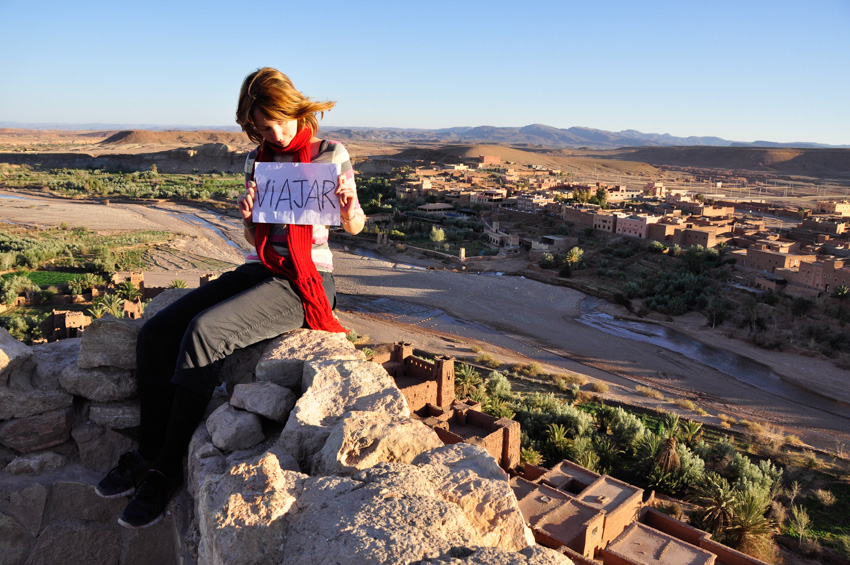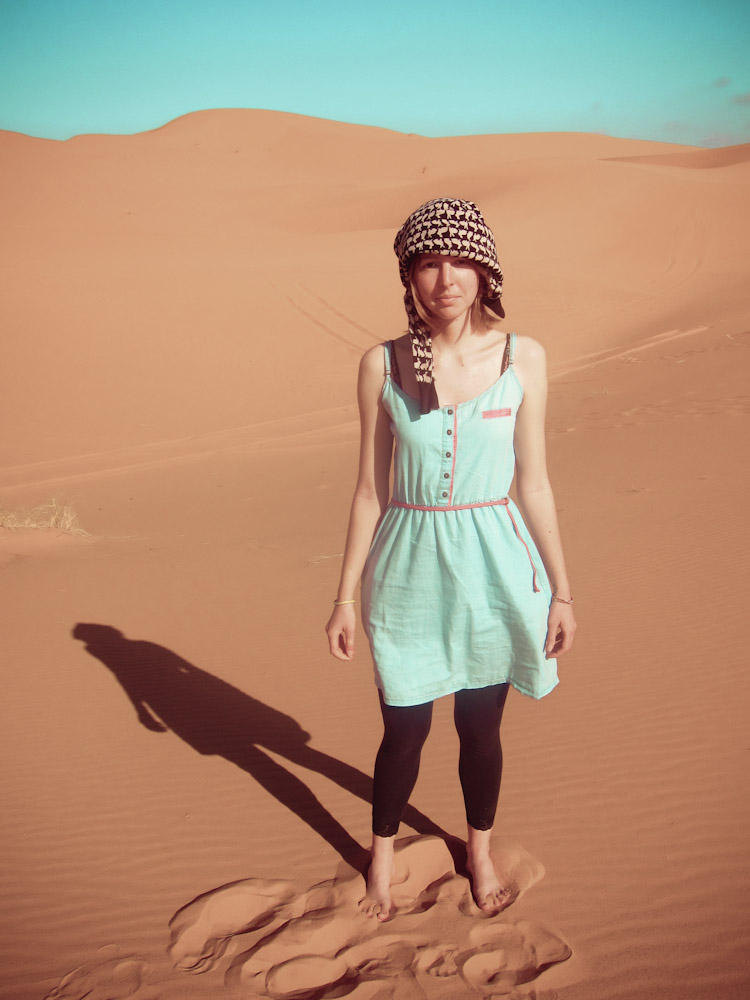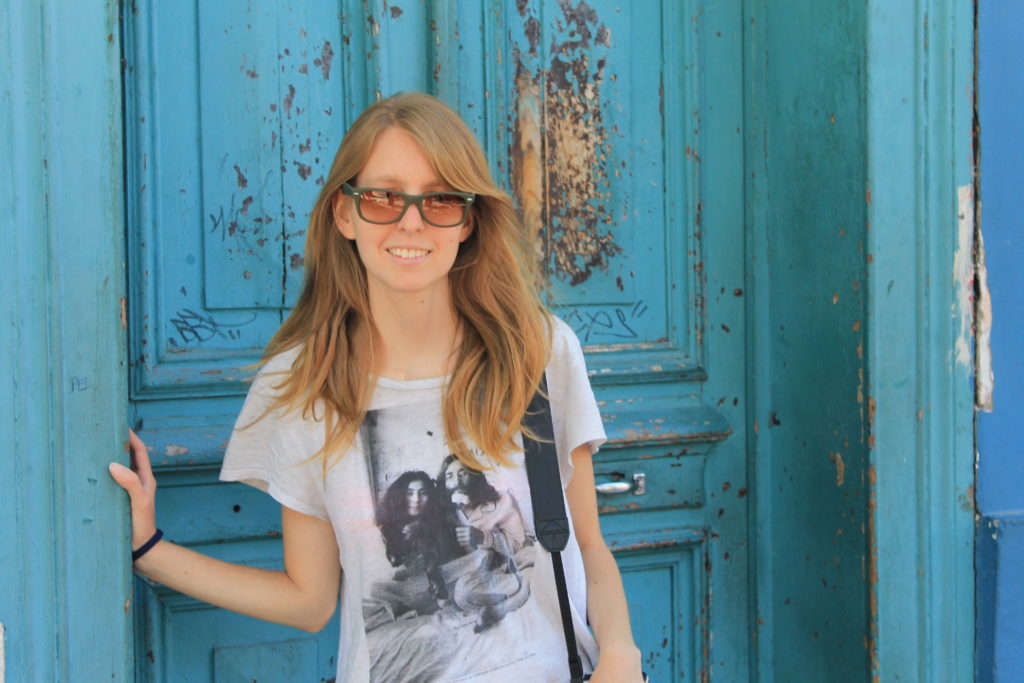How to Travel for Seven Years & Sell 2,000 Books With Aniko Villalba
This is part of my new interview series, designed to demonstrate the wildly varied ways we can live, work, and chase our dreams. Please keep in mind that, since these are interviews, the opinions, methods, and websites contained within do not necessarily reflect my own views or experiences. (Which is, in my opinion, part of what makes them wonderful.)
First, tell us about you.
I’m 29 years old and I was born in Buenos Aires. I have a Hungarian and Spanish background, but grew up in Argentina. I am a writer and photographer and I’ve been living as a digital nomad since 2008. Apart from traveling and writing, I love to walk, swim, read, design, watch movies, and learn. I try to surround myself with things, people, and ideas that inspire me. [Editor’s note: You can find Aniko’s blog, which is in Spanish, here.]
When did you start traveling? What inspired you to leave?
I started traveling when I was 22. I’d done many trips before with family and friends, but after finishing university I decided that I wanted to travel full-time, write about my experiences, and generate an income from that. I didn’t know anyone who lived that way and many people told me I was crazy, but for me it was crazier to stay and live a life I didn’t want. I knew office hours and bosses were not for me; I wanted to have my own schedules and work in my own projects and my biggest goal was to publish books with my travel stories.
Many things inspired me to leave, but one of the most important reasons was a Bolivian girl I met on a train trip from Uyuni (in Bolivia) to the border with Argentina. I still hadn’t finished university and I was traveling alone for a few days; it was my first trip as a backpacker. I took that train and traveled all night through the Altiplano. It was very cold and I didn’t have warm clothes. When I woke up, I realized that someone had covered me with a blanket and when I looked up I saw a girl of about my age smiling at me. She was holding her newborn baby and I realized that she had covered me with the same blanket as her child. That, for me, is what traveling is about: human contact, hospitality, building bridges between people. And I wanted to have more experiences like that. I was tired of hearing what a dangerous place the world was, so I decided to travel and show people that they were wrong.

What has kept you going for seven years?
Even though many things happened during these seven years, I feel I couldn’t be living in a different way. Apart from moving from one place to another and getting to know places and cultures, this lifestyle allows me to own my time and that is something I will never trade for anything. I love having my schedules, working at my own pace, choosing my workspace, and deciding how and with whom I spend my days. I also love knowing that whenever I get tired of traveling, I can stop and stay in one place for a while.
How did you afford to leave and start traveling full-time? How do you make a living from the road? How long did it take to make your travels financially sustainable?
Traveling around the world as a writer was my long-time dream and I started saving up for that many years before leaving. So at first I traveled with these life savings, which were not much, but helped me start. At the same time, I discovered that traveling independently was much cheaper than taking a traditional holiday. I realized that I could shrink a lot of expenses, such as accommodation, transport, and food and that I didn’t need many others (such as guided tours). I started traveling low budget and I still travel that way because I think it makes you interact a lot more with the local culture.
Now, I make a living as a writer and photographer. Sometimes I trade work for accommodation or for something I need at the moment and other times I earn money for what I produce. It took about two years for my travels to become financially sustainable. At first, it was hard because any journalistic or writing job is very badly paid in Argentina, but things changed for me when I decided to start self-publishing my books.

Tell us about your book. When did you decide to write it? What was the writing process like? How did you publish and publicize it?
Writing books was my other lifelong dream. I’ve always loved writing and wished I could do it for a living, but at first I didn’t think it was possible, seeing that traditional publishing doesn’t give too much to the authors in terms of money unless you are a bestseller. But I knew there had to be another option, so I chose the self-publishing path.
I decided to write my first book after five years of traveling. I felt I had enough experiences to share and I also wanted to give closure to those first five years. The writing process was exhausting and addictive; it took me nine months of full-time work and since I self-published I did more than just writing. I also designed the interior of the book. I set up an online store on my website. I made the ebook version. I organized an online pre-sale. I looked for a printer. I organized the presentations. I worked together with my editor and illustrator. And it was very consuming. After that, I said I would never write a book again, at least for a few years, but now I’m writing my second. If you love writing, it’s impossible to stop.
I publicized the book through my blog and social media and thanks to my readers I was able to crowd-fund the printing.

You sold thousands of copies of that book, correct? Any book marketing tips for the rest of us?
Yes, my book is in it’s third edition. I think for self-publishers it’s very useful—or even necessary—to have a blog and online presence. I wouldn’t have been able to sell so many copies this way if I didn’t have a readership that followed me beforehand. So I think you should build an audience first and then ask for their help and, at the same time, offer them something you know they will enjoy.
What are some important things you think people should know about travel—and particularly full-time travel—that we don’t hear about often?
That every lifestyle has it’s dark side. And by dark I don’t mean bad…I mean less publicized. Many people idealize the traveler’s life. I also idealized it before I lived like this. I thought I would be happy 24 hours a day…things seemed more glamorous from a distance. But after seven years of life on the road, I discovered that this lifestyle is far from perfect—just as any other lifestyle is. You can be in the most beautiful place in the world and still feel sad. You have to learn to say goodbye to people almost every day. You have to learn to be treated as the traveler who will leave soon. Fear, anxiety, stress, sadness, loneliness, disillusion, heartbreak: all these things also exist on the road and they are hard to handle when you are by yourself and far from home.

What advice would you give to someone who wants to leave their home behind to travel indefinitely?
I would tell them to go for it. If that’s what they want, at least they should give it a try. I receive a lot of emails from people who say they want to live a traveling life but they are scared or they don’t want to leave their family or their parents don’t support them or everyone tells them they are crazy. People told me these things also. Everyone thought I wanted to run away from any obligation and lay down in the sun all day; they said this life I wanted was not real. My advice: don’t listen to them. If you want to travel, just go. But go with an extra element: a job, a project, a passion, something to do along the way. And go knowing that it’s not a perfect lifestyle and that you will still feel low some days and that’s normal.
What do you love most about your life now?
My independence. I love to be able to decide where I want to live, for how long, with who. I love to be able to move around whenever I want. I love to be able to create my workspace anywhere. I think even if I stopped traveling, I would never stop working from home.
What are some of the biggest challenges?
I think the biggest challenges for me right now are the emotional ones. I miss being close to my friends; many of them are having kids and I haven’t even met them, others are getting married and I know I won’t be able to make it to the ceremony. I would also like to spend much more time with my parents. I often have this feeling that I would like to split in half and be in Buenos Aires and traveling at the same time.
It’s also a challenge to work from a distance. It’s not the same to edit a book sitting side by side with your editor as it is to do it via Skype.
Writing is another big challenge for me. Even though I love to do it, I always have doubts about what I publish and having a new book soon is something that makes me happy and scared at the same time.

How do you choose where to travel to next?
In general, I follow my intuition. I like to say that places call me and I obey. Maybe I start thinking about traveling somewhere and then I get all these signs that I should go there, so I go. Other times I go to places just because I’m nearby and why not? Sometimes people invite me to their homes or to see their cities and if I happen to be nearby, I accept the invitation. I always have many places in my mind, but there’s usually one that I feel more strongly that I have to go to, so I go. However, I don’t hop from one continent to the other all the time; I try to stay in one region for a long time and see what’s there. Also, I hate flying.
What are you doing now and what’s next for you (both in travel and your writing/work)?
I’m living in Biarritz, France, for a few months and writing my second book. After one year of nonstop traveling around South America and Europe, I felt I needed to slow down and have a home for a while. I always Couchsurf and don’t stay in hostels very often, so I was tired of being a guest all the time and not having my own space. I never thought I would stay in France, but here I am.
At the same time, I felt I wanted to write another book, so everything fell into place. My plan is to stay here until July and then go back to Argentina for a while to print and present my book, be with my friends and family, and spend some time in a city where I’m not a foreigner. After that, I’d like to travel around Patagonia or go to Japan. I’ll see which one calls me more!
Did this post help you? Share the love by:
:: Buying a copy of my Italy, France, Switzerland, Paris, Barcelona, or Prague guides (already have one? Gift another to a friend!)
:: Clicking here before you make your next Amazon order (it doesn’t matter what you order, if you start by clicking from my site, I’ll get a commission!)

Aniko
Thanks for a lovely interview, Gigi!
See you again somewhere!